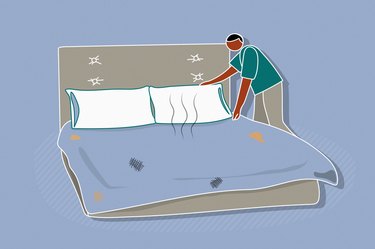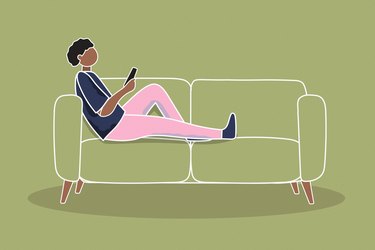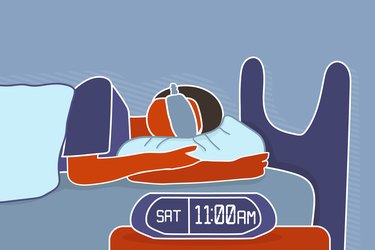
Real talk: When was the last time you changed the sheets on your bed? Last week? The week before? Or maybe it's been so long that you've kind of lost track...
Although most health professionals (and the Sleep Foundation) urge people to suds their sheets about once a week, we get why you might let things slide. Laundry isn't exactly our favorite way to spend a Saturday afternoon either.
Video of the Day
Video of the Day
But aside from the grossness factor, could not changing your bed linens actually be bad for you? Here, experts unpack the dirty truth.
Tip
You should aim to wash your sheets weekly to control allergies and skin issues, but there are ways you can safely stretch that timeline to about two weeks.
Unwashed Sheets Can Trigger Allergies (Both Old and New)
Meet the arch nemesis of allergy sufferers: dust mites. "These tiny, bug-like creatures might be the most common trigger for year-round asthma and allergies, and they thrive in bedding," says Melanie Carver, chief mission officer of the Asthma and Allergy Foundation of America (AAFA).
Although you can't see them with the naked eye, dirty bedding is crawling with these microscope critters. "They feed mainly on the tiny flakes of human skin that people shed each day," Carver says. With every toss and turn between your sheets, you naturally slough off dead skin cells for dust mites to feast on.
"These skin cells work their way deep into the inner layers of furniture, carpets, bedding and even stuffed toys," Carver says. The dust mites themselves, as well as the — ahem — excrement they leave behind, are common allergens for many people.
Dust mites aren't the only thing that can build up in unwashed sheets and make you sneeze. "In humid climates, bedding can grow mold," Carver says. "In addition, pollen can enter your bedroom through open windows or get tracked in on your clothing or your hair."
And let's not forget about your fur baby. "Animal dander can get on beds," Carver says. "Long-haired pets can also carry pollen inside during high-pollen seasons like spring and fall."
In fact, an August 2018 study in Current Allergy and Asthma Reports found that bedrooms are hot spots for allergen exposure because we spend hours inhaling and exhaling the air while we sleep. More than 90 percent of bedrooms contained three or more detectable allergens, and 73 percent had high levels of them.
Think you're off the hook because you don't have allergies? Get this: According to the study, sleeping in a room teeming with dust mites, pet dander, pollen or fungus might actually sensitize you to the allergen, triggering a new reaction.
Per the AAFA, signs of a dust mite allergy include:
- Sneezing
- Runny nose and/or congestion
- Itchy, red or watery eyes
- Itchy nose, mouth, throat or skin
- Post-nasal drip (a flow of mucus from behind your nose into your throat)
- Coughing
"If your allergy triggers your asthma, you may also experience difficulty breathing, chest tightness or pain and a whistling or wheezing sound when breathing out," Carver says.
As if these symptoms weren't bothersome enough on their own, they can also lead to trouble sleeping. An August 2017 study in Allergy, Asthma, and Clinical Immunology concluded that poor sleep is highly linked with allergic rhinitis. And of course, lousy shut-eye compromises your health in countless ways.
Related Reading
It Could Lead to Breakouts
Sheets + moisture = potential skin problems.
"If you sweat or drool during the night or if you work out in the evening and don't shower before bed, you might develop acne or folliculitis," says Robin Evans, MD, a board-certified dermatologist and clinical instructor of dermatology at the Albert Einstein School of Medicine.
How do icky sheets lay the foundation for zit city? Well, if you're rolling around in perspiration or resting your cheek on a slobber-soaked pillow, these substances can plug up your sebaceous glands (which line your pores and secrete oil to keep your skin soft and moisturized). "When your sebaceous glands are clogged, that oil gets trapped inside," Dr. Evans says. "This sets off an inflammatory response resulting in the appearance of blackheads or whiteheads."
Folliculitis, or "scalpne," arises in the same manner. "Excess sweat clogs the hair follicles, creating inflammation and the formation of a pimple or pustule on the scalp," Dr. Evans says.
But then again, nasty sheets don't necessarily spell doom.
"Although there may be a theoretical risk of developing skin conditions [from sleeping in unwashed linens], that is not established in the scientific literature," says dermatologist Heather Woolery-Lloyd, MD, director of the Skin of Color Division at the University of Miami Department of Dermatology and spokesperson for the Skin of Color Society. In other words, your skin might be A-OK, even if it's been ages since you last tossed your sheets into the wash.
You Could Get a Rash
Red, itchy bumps are another tipoff it might be time to freshen up your bedding.
"Mildew, mold or fungus could grow in damp sheets," Dr. Evans says. "Depending on the degree of mold and how sensitive your skin is, this could cause eczema flareups or an allergic skin reaction called contact dermatitis."
Rash-prone people also need to hear this: "It is important to note that washing sheets in detergents that have fragrances and other chemicals can aggravate eczema," Dr. Woolery-Lloyd says. So if you have sensitive skin, use a gentle, unscented product labeled "free and clear."
"Also avoid fabric softeners and dryer sheets, which have silica particles in them that can cause irritation," Dr. Evans says.
How Often Should You Change Other Types of Bedding?
It's not just sheets that pose a problem. Here's how often you should be laundering or swapping out your other linens, according to the Sleep Foundation:
- Duvet cover: Every 2 weeks to 1 month
- Comforter/blanket: Every 2 to 3 months
- Pillows: Every 4 to 6 months
Hate Laundry? Do These 9 Things to Wash Your Sheets Less

If laundry is the bane of your existence, these tips might give you leeway to lengthen the time between washes. (Think: Throwing a load in every 10 to 14 days instead of weekly.)
1. Set Your Thermostat Below 68°F
A chilly bedroom will slash your dust mite load. "Dust mites thrive in temperatures of 68 to 77 degrees," Carver says.
Keeping your boudoir cool will also reduce the amount you sweat in your sleep, lessening your risk of mold and fungal growth. Plus, it may lead to better quality sleep, since when your room gets too toasty, it can lead to restlessness along with increased difficulty falling and staying asleep, per the Cleveland Clinic.
To that end, folks who perspire between the sheets are better off wearing lightweight PJs and covering up with a thin blanket instead of a heavy comforter.
2. Ditch Your Humidifier
"Dust mites like humidity levels above 50 percent," Carver says.
3. Make Your Room a Pet-Free Zone
"If you are allergic to animal dander or pollen, close the bedroom doors when you're not home to keep pets out," Carver says.
And don't let them sleep with you. We know how cuddly they are, but the snuggles aren't worth the sneezing.
4. Shower Before Bed Instead of in the Morning
"This will remove pollen and sweat from your body and hair," Carver says.
It's also helpful to wear clean pajamas.
5. Shut Your Windows During Allergy Season
"Keeping them closed when pollen counts are high will help prevent pollen from drifting in and settling on your sheets," Carver says.
6. Don’t Make Your Bed
You don't have to tell us twice!
"Leave your bed unmade or with the sheets and covers turned down to air them out," Carver says. "If you make your bed, it traps the warmth and humidity left from your body under the covers, which helps dust mites [and mold] multiply."
7. Cover Up Your Pillows
Zippered, dust-proof mattress and pillow protectors can help keep dust mites from burrowing deep into your bedding. These ones have been scientifically proven to provide an effective bug barrier, according to AAFA.
8. Use Hot Water
"Washing your sheets, pillowcases and blankets in water that is 130°F or hotter can kill and remove dust mites," Carver says. "Then dry them in a hot dryer cycle."
9. Clean Your Pillowcases Frequently
Drooling goes hand-in-hand with mouth-breathing and snoring. So Dr. Evans recommends laundering your pillowcases on the reg, even if you slack on the rest of your sheets.
So, How Bad Is It Really to Rarely Wash Your Sheets?
Sleeping in well-seasoned sheets may affect each of us differently — for some it's problematic, but for others it's NBD.
First, consider your allergies. "If you have existing allergies, washing your sheets frequently is important," Dr. Woolery Lloyd says. "For those who are not predisposed to allergies, less frequent sheet washing is not as likely to make a tremendous impact on health."
If you only have seasonal allergies, then you might need to do extra laundry during the spring and fall.
Next, assess your skin. Are you prone to issues like acne, eczema and folliculitis? If your skin looks great, you're probably in the clear. If you're breaking out, experiment to see if washing your sheets more frequently — using a gentle detergent, of course — improves your complexion.
Finally, your sleep behavior plays a role. Heavy droolers and sweaters, for example, may want to swap out sheets on a schedule, Dr. Evans says.
Ultimately: "If you feel healthy, then you are probably not harming yourself," Dr. Evans says. "But if you're developing skin problems or allergies, you may want to change your sheets more often."
If you still can't help letting laundry fall by the wayside, try shifting your mindset: "Life can get messy and busy, but think of taking the time to wash your bedding as an act of self-care," Carver says. "There's nothing like slipping into fresh sheets for solid rest."
After all, three-quarters of people report getting a more comfortable night's sleep on crisp, clean sheets, according to the Sleep Foundation. And that is so worth it.
- Sleep Foundation: "How Often Should You Wash Your Sheets?"
- Current Allergy and Asthma Reports: "Bedroom Allergen Exposure Beyond House Dust Mites"
- Allergy, Asthma, and Clinical Immunology: "Poor sleep is highly associated with house dust mite allergic rhinitis in adults and children"
- Sleep Foundation: "Fresh Sheets for Better Sleep"
- Cleveland Clinic: "What’s the Best Temperature for Sleep?"
Is this an emergency? If you are experiencing serious medical symptoms, please see the National Library of Medicine’s list of signs you need emergency medical attention or call 911.



